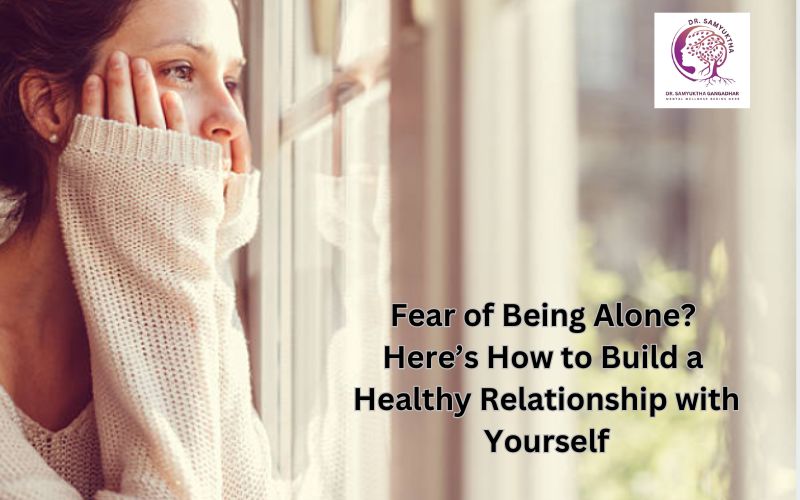The fear of being alone, also known as autophobia or isolophobia, is a common emotional struggle that can manifest as anxiety or an overwhelming dread of isolation. This fear not only affects our emotional well-being but also impacts mental health.
If you find yourself constantly seeking companionship or avoiding solitude, you may be experiencing this fear. The good news is, overcoming it is possible. Building a healthy relationship with yourself can help restore your peace of mind.
This blog, created with the guidance of Dr. Samyuktha Gangadhar, M.D. (Psychiatrist) at Pushpa Mind Care, offers practical steps to help you overcome the fear of being alone and use solitude as a chance for personal growth.
Understanding the Fear of Being Alone
The fear of being alone can stem from sources like childhood experiences, past trauma, or cultural expectations. Those affected often struggle with feelings of abandonment, isolation, and unworthiness. While the fear of loneliness is an emotional state, the fear of being alone is a more pervasive, often irrational fear of solitude. Both fears are interconnected, as being alone can trigger intense loneliness.
Why Is the Fear of Being Alone So Common?

In today’s fast-paced world, rising anxiety and stress have made the fear of being alone more common. Social isolation and loneliness can lead to issues like depression and cognitive decline. Despite being constantly connected through social media, many still feel emotionally isolated, which only worsens the fear of being alone.
How to Build a Healthy Relationship with Yourself
Building a healthy relationship with yourself is the first and most crucial step toward overcoming the fear of being alone. At Pushpa Mind Care, Dr. Samyuktha Gangadhar often emphasizes the importance of self-compassion, mindfulness, and cognitive restructuring to help patients reframe their perceptions of solitude. Here are actionable steps you can take to develop a positive relationship with yourself:
1. Practice Mindfulness and Self-Awareness
One of the most powerful tools in overcoming fear is mindfulness. Mindfulness means being fully aware of the present moment, recognizing your thoughts and feelings without judgment. This practice helps to break the cycle of negative thinking that fuels the fear of being alone.
How to practice mindfulness:
- Start with deep breathing exercises.
- Use guided meditation to stay grounded.
- Observe your thoughts without attaching meaning to them.
By cultivating self-awareness, you can begin to understand why you feel anxious when alone, and gradually work on changing these negative patterns.
2. Reframe Your Thoughts: Change the Narrative
The fear of being alone often comes from thinking solitude equals loneliness or sadness. Cognitive Behavioral Therapy (CBT) can assist in changing these thought patterns. Instead of saying, “I can’t be alone,” try thinking, “Being alone is a chance to reconnect with myself.” Dr. Samyuktha Gangadhar helps patients replace negative self-talk with positive, empowering thoughts, gradually changing their view of solitude.
3. Set Aside Time for Yourself
We often spend so much time focusing on others—whether it’s family, friends, or work commitments—that we forget to nurture our own needs. Setting aside intentional alone time allows you to reconnect with yourself.
Suggestions for “me-time”:
- Pick up a book you’ve been wanting to read.
- Take a walk in nature, without distractions.
- Engage in a hobby or learn something new that excites you.
The key is to make your alone time enjoyable and fulfilling. By doing so, you’ll begin to see solitude as a positive experience rather than something to be feared.
4. Cultivate Self-Compassion
Building a healthy relationship with yourself means treating yourself with the same kindness you’d offer a friend. If you feel anxious or overwhelmed when alone, acknowledge those feelings without judgment. Self-compassion helps reduce fear and build emotional strength.
Steps to practice self-compassion:
- Treat yourself with kindness when you experience loneliness.
- Practice affirmations that promote self-love.
- Recognize that it’s okay to feel lonely at times, but you are not defined by that emotion.
5. Embrace Solitude as Self-Discovery
The fear of being alone often comes from avoiding your own thoughts and emotions. However, solitude can help you discover more about yourself and your passions. Use alone time for personal growth—reflect on your goals, practice gratitude, or try journaling. Over time, you’ll start to see solitude as an opportunity for self-development, easing the fear of being alone.
6. Seek Professional Help if Necessary
If your fear of being alone is significantly impacting your life and well-being, it might be time to seek professional help. At Pushpa Mind Care, Dr. Samyuktha Gangadhar specializes in providing support to individuals dealing with anxiety, fear of loneliness, and other mental health concerns. Therapy, such as Cognitive Behavioral Therapy (CBT) or mindfulness-based interventions, can help you work through your fears in a supportive and structured environment.
How to Overcome Loneliness

The fear of loneliness can be overwhelming, but it’s important to remember that loneliness is a natural emotion that everyone experiences at some point. Overcoming loneliness involves building meaningful connections and cultivating a sense of self-worth.
Here are some ways to overcome loneliness:
- Join support groups: Connecting with people who share similar experiences can help you feel understood and supported.
- Volunteer: Helping others can shift the focus from your own feelings of loneliness to making a positive impact in the community.
- Seek therapy: A licensed therapist can help you work through feelings of loneliness and develop healthy coping mechanisms.
Remember, loneliness doesn’t define you. It’s a temporary emotion, and with time, support, and self-care, you can overcome it.
Conclusion
The fear of being alone doesn’t have to control you. By taking steps to build a healthier relationship with yourself, such as practicing mindfulness or seeking professional help, you can overcome this fear and find peace in solitude.
Dr. Samyuktha Gangadhar, M.D. (Psychiatrist) at Pushpa Mind Care is here to help you navigate these challenges. If you’re struggling with the fear of being alone or loneliness, reach out for support.
It’s not about avoiding being alone—it’s about learning to enjoy your own company.
FAQs
Fear of being alone, or autophobia, can stem from anxiety, past trauma, or a fear of facing your own emotions. At Pushpa Mind Care, Dr. Samyuktha Gangadhar, M.D., helps individuals understand and overcome this fear with therapy and mindfulness techniques.
Autophobia can be caused by:
- Past trauma or unresolved emotional pain
- Anxiety disorders or generalized fear
- Low self-esteem or feelings of unworthiness
- Social isolation or chronic loneliness
Pushpa Mind Care offers personalized treatment to address these causes.
- Monophobia: Fear of being alone in social situations or public places.
- Autophobia: Fear of being alone in private, often linked to feelings of abandonment or panic.
At Pushpa Mind Care, Dr. Samyuktha Gangadhar helps differentiate and treat both fears with tailored approaches.

